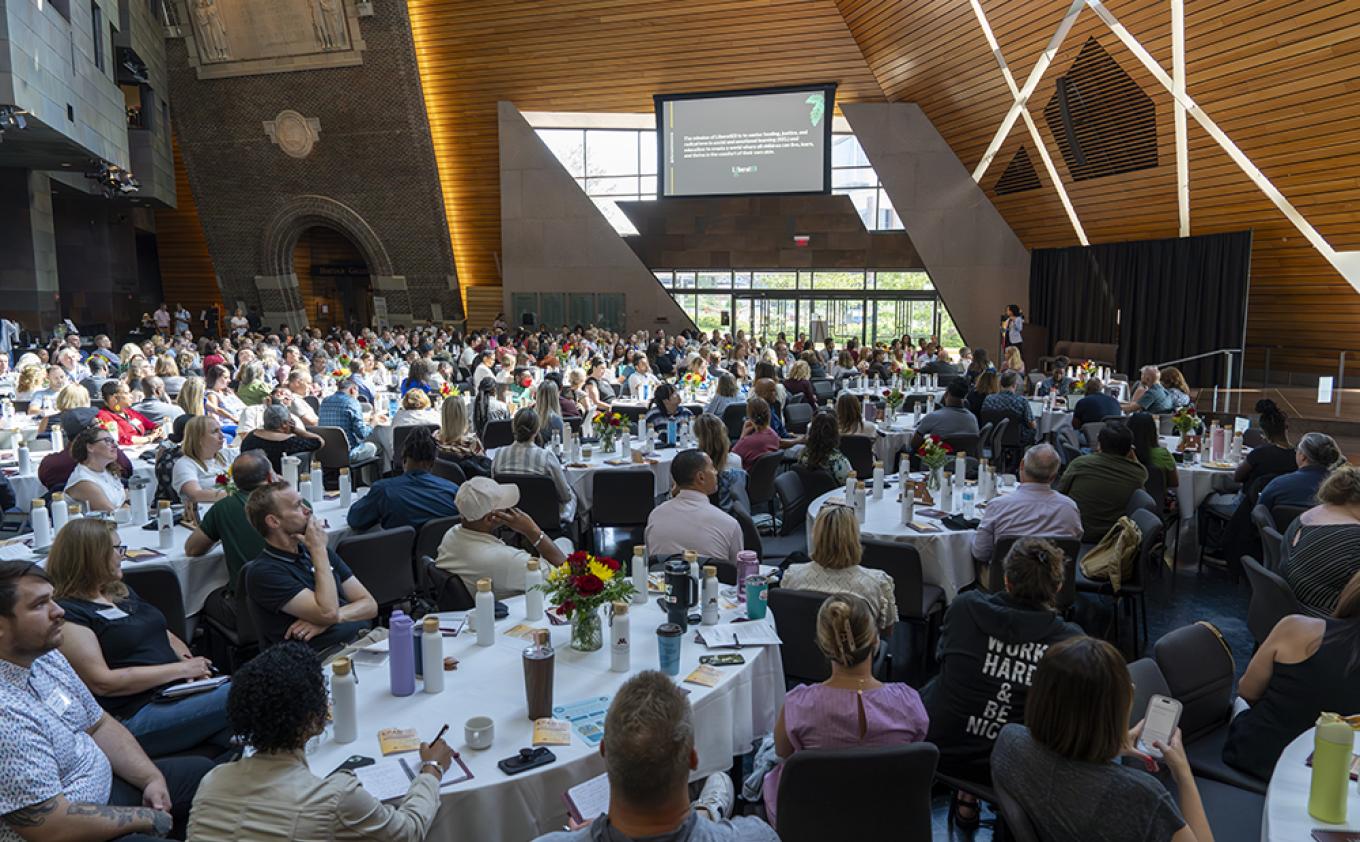News

2025 LEAD conference: Addressing the challenges of today’s educational landscape
More than 360 education leaders attended this year’s Leading in Equity, Action, and Diversity (LEAD) conference, which took place July 29 to 31 at McNamara Alumni Center. The annual CEHD-hosted event offers insights, tools, and strategies for creating more equitable education systems that eliminate racial harm and disparities in students’ opportunities, experiences, and outcomes. View images of the event.
There were numerous breakout sessions to choose from, providing a vast range of tools and ideas for participants to take back to their home districts.
Challenges and hopes
On the first day, attendees were treated to a discussion featuring panelists representing the various sectors connected to the conference. Panelists included Lt. Governor Peggy Flannagan representing the legislative side, Minneapolis Public Schools Superintendent Lisa Sayles-Adams representing PreK-12, and CEHD Dean Michael C. Rodriguez representing higher education. The panel moderator was CEHD Executive Director of Educational Leadership Katie Pekel.
The panelists reflected on what stands out to them as the biggest challenges they are facing in the current environment as well as what gives them hope. Flannagan acknowledged that the unpredictability of what is coming down from the federal administration right now is incredibly difficult to navigate, but it is an inflection point. “This provides us an opportunity. We should not be satisfied fighting back to a draw,” she said. “Will we stand up for what we believe in; the folks we are fighting for?”
Rodriguez said many policies are designed to segment the education field and create a competitive environment, which is why it is important to connect K-12 with higher education. The day before the conference, he said he was in a virtual meeting with 30 school of education in the state. “These academic leaders dedicated three and a half hours to a conversation about our unique mission and our opportunities,” he said to the audience. “We committed to leverage our collective impact for the state of Minnesota. I’m happy to announce the 30 of us are going to work together much more closely and we are going to draw on many of you to make that happen.”
“I believe we are in the civil rights battle of our time to protect public education,” Sayles-Adams said. “It’s been a struggle to keep up with all the changes.” However, there is the potential to quickly pivot, she explained, pointing out it has been done before. “Think of how we pivoted to serve our children during COVID,” she said. “When you think of the power we have collectively, the answer is in this room to change public education. We have the resources, we have the talent, we have the intellect. The opportunity is there.”
Be at School
New at LEAD this year was an extra day in partnership with Hennepin County’s Be at School program, which focused on addressing the barriers to school attendance for K-12 students and their families.
The keynote address, “Rethinking Chronic Absenteeism: Collective Solutions for a Complex Problem,” was presented by Sarah Winchell Lenhoff, an associate professor at Wayne State University’s College of Education in Detroit, Michigan.
“There are no silver bullet answers here. Schools have limited resources. Part of this talk is to invite you to think of innovative ways to solve this problem,” she told the audience. “Despite there is not being a silver bullet, we have clear insights for what schools should and should not be doing and how they can improve what they are doing.”
In general, schools should focus on the fundamentals (effective communication, strong relationships, and creating a positive school climate), work with families to better understand and address local barriers to attendance, and avoid counterproductive practices, such as attendance incentives and punishments.
“Attendance really matters,” she said.
Another highlight of the day was a panel discussion featuring Scott County Intake and Prevention Supervisor Samantha Goldman, Jordan Middle School Principal Rep. Ben Bakeberg (R-54B), and Columbia Heights Public Schools Assistant Superintendent Bondo Nyembwe.
Coming at the issue as both a principal and politician, Bakeberg said a key issue is literacy. “If a kid can’t read, they can’t lead,” he said. “I see a lot of faces around the capitol, and we have a lot of differences, but that is something we can agree on. If I kid is not at school, they can’t learn to read. And if they are not in school, they can get into trouble.”
Nyembwe agreed. “If my children can be successful, I want other people’s children to have that same success,” he said. “The drive for me is why students are not showing up. In order to win, you’ve got to show up.”
Goldman said she views the topic from a child welfare lens. “When children attend school and constantly show up, they are more successful as they get into adulthood. They can be functioning members of society, eliminating the need for interventions with families.”
The panel all agreed that building relationships and creating partnerships outside the school system are integral in addressing absenteeism. “There’s an African proverb: If you want to go fast, go alone. If you want to go far, go together,” Nyembwe said.
Nyembwe said the Columbia Heights schools found an important partner with Promise Fellows from the Minnesota Alliance for Youth. Promise Fellows work with students in grades six through 12 to help with attendance, course engagement, and in general, having a fulfilling educational experience. “When you look at the data, it’s impressive,” Nyembwe said. “Did the attendance improve? For some it didn’t, but course completion and engagement improved. What we did see was an increased sense of belonging because students had someone to talk to. The students were appreciative of the relationship, and we know that relationship precedes learning.”